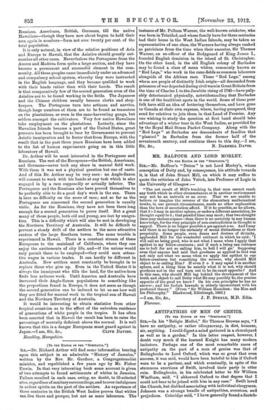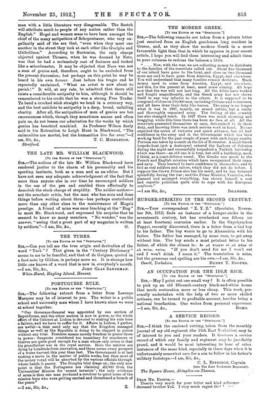ANTIPATHIES OF MEN OF GENII'S.
(To THE EDITOR OP THE "SPECTATOR."] SIR,—In his " Religio Medici," Sir Thomas Browne says, "I have no antipathy, or rather idiosyncrasy, in diet, humour, air, anything. I could digest a salad gathered in a churchyard as well as in a garden." In this latter respect, however, I doubt very much if the learned Knight has many modern imitators. Perhaps one of the most remarkable cases of antipathy on the part of a man of genius was that of Bolingbroke to Lord Oxford, which was so great that even success, it was said, would have been hateful to him if Oxford were to be a partner, and which eventually, in spite of the strenuous exertions of Swift, involved their party in utter ruin. Bolingbroke, in his celebrated letter to Sir William Windham, said, "I abhorred Oxford to that degree that I could not bear to be joined with him in any case." Swift loved the Church, but disliked associating with individual clergymen. Johnson was a strange bundle of antipathies, aversions, and prejudices. Coleridge said, " I have generally found a Scotch. 'man with a little literature very disagreeable. The Scotch will attribute merit to people of any nation rather than the English." Hegel and women seem to have been amongst the chief of the many antipathies of Schopenhauer, who very un- gallantly said of the sex that, "even when they meet one another in the street they look at each other like Guelphs and Ghibellines." According to Suetonius, the only charge objected against Thrasea, when he was doomed by Nero, was that he had a melancholy cast of features and looked like a schoolmaster. It may be objected that Nero was not a man of genius and, therefore, ought to be excluded from the present discussion; but perhaps on this point be may be heard in his own favour. Just before his tragic end he repeatedly exclaimed, "What an artist is now about to perish !" It will, at any rate, be admitted that there still exists a considerable antipathy to him, although it should be remembered to his credit that he was a strong Free Trader. To bend a crooked stick straight we bend in a contrary way, and the best antidote to antipathy is a deep, broad, unfailing charity. After all, the antipathies of men of genius are but excrescences which, though they sometimes amuse and often pain us, do not lessen our admiration for the works by which genius has benefited mankind. As Professor Wilson finely said in his Retraction to Leigh Hunt in Blackwood, "The animosities are mortal, but the humanities live for ever."—I















































 Previous page
Previous page